We asked our staff: What does being a humanitarian mean to you?
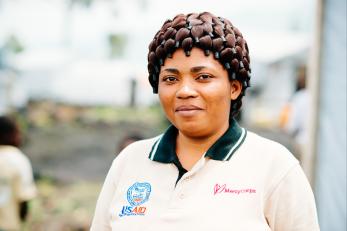
Our work in more than 40 countries around the world would not be possible without the combined efforts of our global community. Every donor, supporter, partner and team member plays an important role in how we help people in need survive now and thrive for years to come.
This World Humanitarian Day, we honor the many ways that together, we are helping people survive crisis, recover from disasters, and build back stronger than before.
Our staff on the ground — and at our global headquarters — turn ideas into real, tangible change each and every day. So we asked them: what does being a humanitarian mean to you?
Tirhas
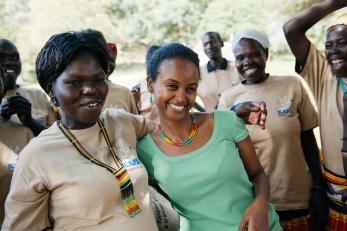
"For me being a humanitarian means to have human values and an understanding of all human situations that we share, regardless of race, ethnicity, religion and social status. It’s working towards common human goals and ensuring we support people with respect and dignity.
My home country (Eritrea) has many humanitarian issues but doesn’t allow humanitarian and development agencies in the country. In my work, I get to hear so many personal stories of what people need and how their lives have changed. This helps me connect with them on a personal level, which will hopefully prepare me to help others in the future and at home in Eritrea.
I love to tell stories, especially individual stories highlighting a community member. It’s always refreshing to hear about what they hope for the future. I feel grateful that my job allows me to bring inspiration to other people as well."
Dia'a
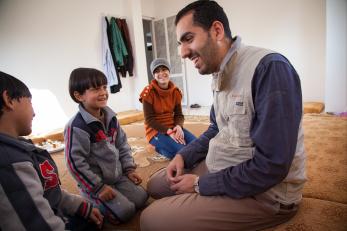
"Being a humanitarian means helping people who are suffering and saving lives any time any place in the world. And so humanitarian work requires being responsible, conscious of the circumstances of other people’s lives, and helping them on the basis of need, without discrimination.
I’m happy to have a job that reflects my values and what I believe in. I’m lucky to make a living working for peace and conflict resolution — this requires integrity, independence and neutrality.
When you change another person’s life positively and lighten the dark they had, you inspire them to be stronger and more creative by remembering you.
The best part of my job is that it allows me to be part of Mercy Corps’ vision of change — I can reduce the suffering of people and help them, and also help create long-lasting change."
Clara
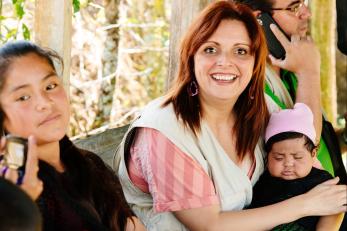
"A humanitarian is able to identify people’s needs and vulnerability with empathy for them. They’re passionate about walking the extra mile to help alleviate the suffering of those in the midst of a crisis.
Since the moment I became a humanitarian worker, I have developed a new perspective on everything around me and I see the world differently. I am more conscious of people and their daily struggles to survive.
My work is important to me because I know it has a ripple effect that impacts the lives of many families and vulnerable populations. As a mother, it’s really important to inspire my kids to help others and never stay in a comfort zone while others need a helping hand.
Going to work for Mercy Corps feels like getting together every day with family members that happen to have your same vision and purpose. The humanitarian heart of the team members is evident inside the office building as well as out in the field.
Knowing that because of our programs, a child won´t go to bed tonight with an empty stomach helps us know that we are being part of the change we want to see in the world."
Ibro
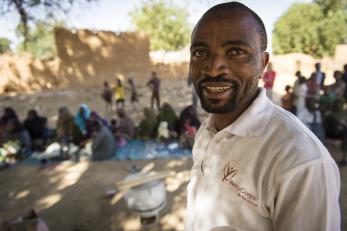
"Being a humanitarian is helping communities identify their opportunities and challenges, helping them believe in themselves, and look for sustainable answers for real change.
This job allows me to help my family and to build my personality in the community. This work has allowed me to know the everyday realities of communities.
My favorite part of my work is when I lead community assemblies and I explain our program vision. I like working with communities and seeing how communities join our work.
Today humanity is facing a series of humanitarian threats: global warming, extreme poverty, the low status of women, rapid population growth, terrorism. That's why humanitarians have to develop new approaches in order to bring answers."
Mirvat
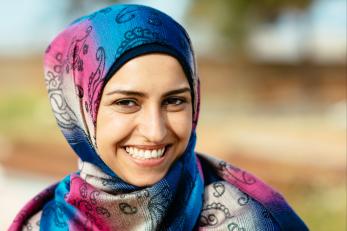
"Being a humanitarian means trying to save lives, alleviate suffering and maintain and protect human dignity — during and in the aftermath of man-made crises and natural disasters.
The work that we do gives me immense self-esteem. We are leading a much more prosperous life compared to the destitute and so we are obliged to give a helping hand.
I count myself very lucky to be a part of a program that is providing the basic needs for the most vulnerable people. I get a lot of satisfaction when I see people smile as they receive the basic things they used to have in their homes, but are deprived of in their current situation."
Reine
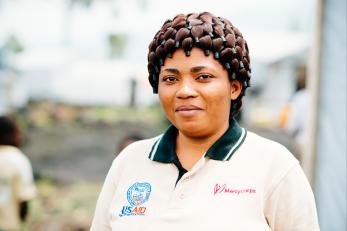
"To me, being a humanitarian means seeking solutions and advocating to help people who face difficulties. We want to save endangered lives, reduce poverty, and promote human dignity.
My work is very important to me personally because it enables me to ensure my family’s survival and allows me to grow intellectually and professionally.
My favorite part of the job is to talk with the people we help — to listen to them, to hear about their experiences and challenges."
Mark
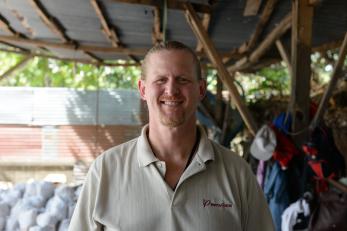
"Being a humanitarian means being empathetic. I'm driven by curiosity to relate and understand the people I work with and for. I want to understand where we come from and what has shaped our world view.
Much of my work has been grounded in my family roots. My family comes from some pretty tough farm background in the rural Midwest. I spent a lot of time on the family farm hearing many of the stories and witnessing some of the challenges.
My work has helped me better understand who I am and where I come from. At the same time, my background has helped me relate to many of the people I've worked with over the years.
Accomplishing things together is exhilarating. There's nothing better than creating a team, sometimes from scratch, and watching that team rally, grow and thrive around a common purpose."
Steven
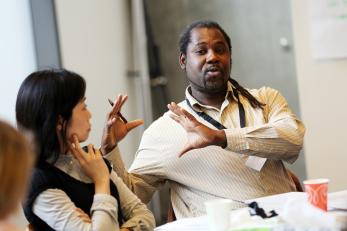
"For me, a humanitarian is a change agent who is dedicated to helping others less fortunate develop the capacity to transform their lives and communities.
I come from a country that witnessed many decades of conflict, which contributed to high rates of poverty and other social problems. While growing up, my aim was to be a social change agent and help address the challenges that countries like my native country were facing.
My favorite part of my job is being in the field and interacting or working with our beneficiaries to find solutions to the problems they face.
The work of humanitarians today is challenging — organizations are constantly responding to complex crises, which impact the poorest people. No one organization or country can meet the challenges caused by disasters, so working collaboratively with other organizations, governments, and the private sector is a challenge that we have to address."
Su'ad
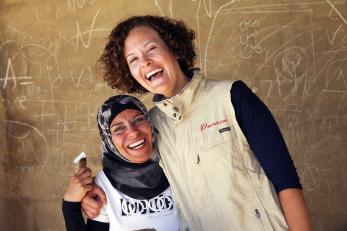
"To be a humanitarian is to wish for those around you and the communities you are working with what you wish for yourself. It is to believe in the infinite capacity of human beings to create a better tomorrow and to seize that and work to create a better tomorrow. It is to treat others like you wish to be treated.
It is a privilege to be working in a field that aligns with my personal values. It’s a rare gift to be able to give back in a greater sense and on a global scale. I believe in the human will to not only survive but also surmount shocks like natural disasters, wars and chronic conflict.
My favorite part of my work is the fact that it is all about tangible human interaction. I do a better job if I can relate to or understand what makes the people I’m working with feel comfortable and satisfied, what aspirations they have and how they foresee their future.
Being a humanitarian confronts you with the worst of humanity and the worst of nature, and that is a constant challenge. How we handle the dismay and turn it into a positive force for change will look different for each individual, each community and each crisis. What is important is to build on our previous experience and to never lose sight of a better tomorrow."